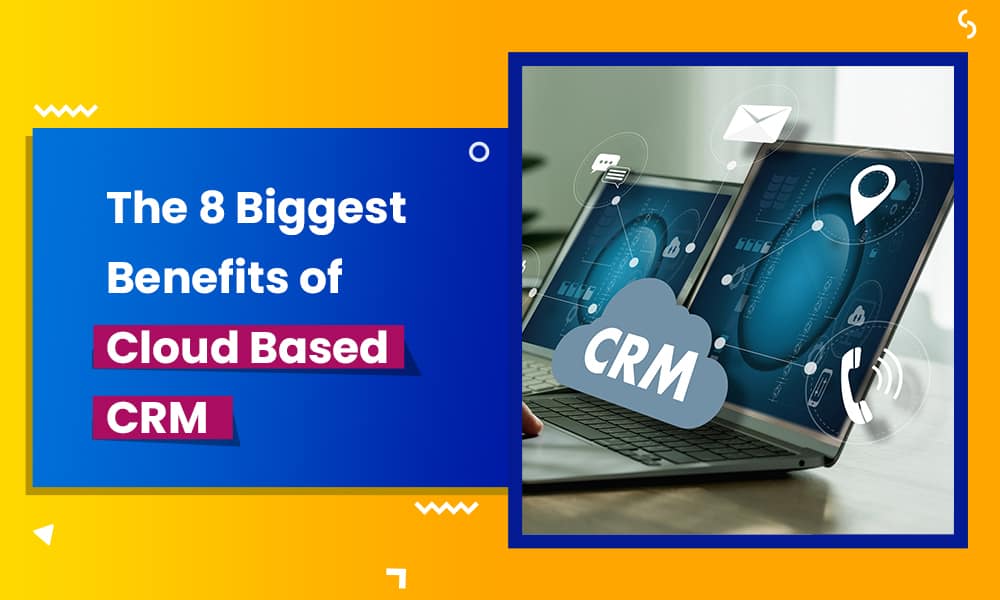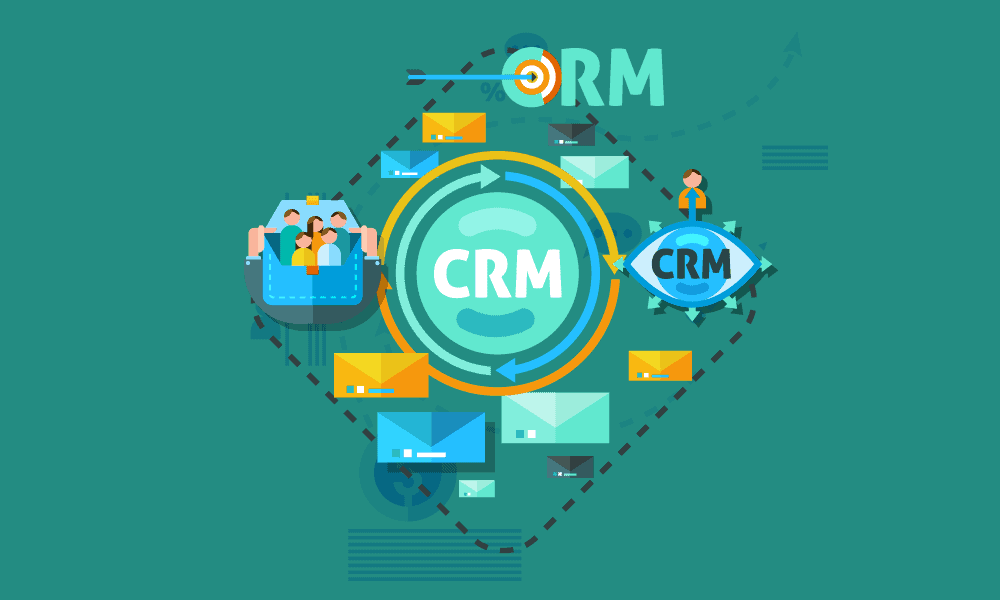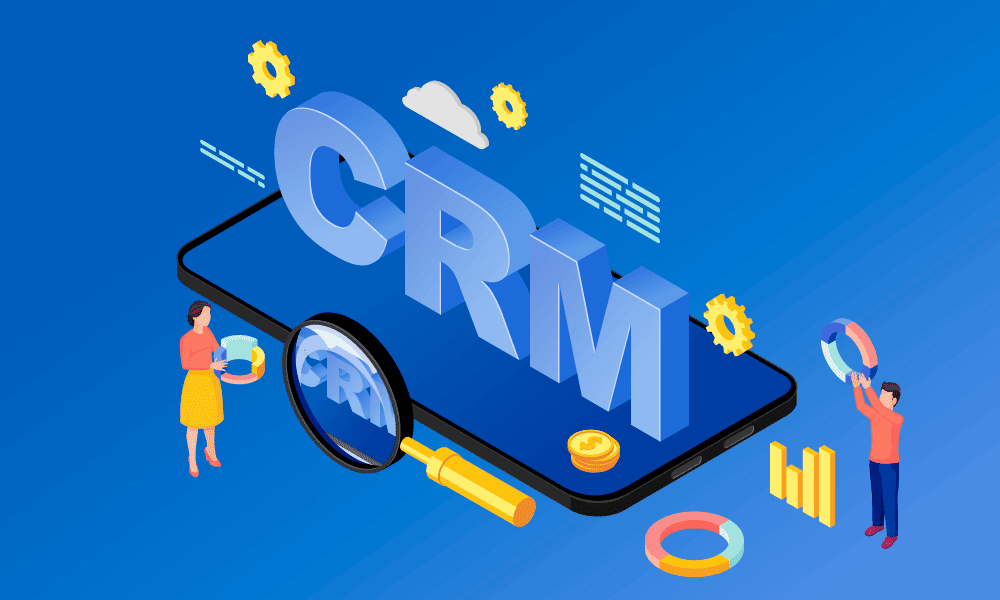Today, almost everything we do is in the cloud. From the data on our computers to that on our smartphones, tablets, smartwatches, and other daily devices, the cloud stores anything and everything so our devices don’t have to.
One workhorse of your sales and marketing strategy is likely a customer relationship management or CRM software, right?
Your CRM technology is the backbone of your operations, offering an array of indispensable features that enable you to effectively manage various aspects of your business. At the heart of it all is contact management, allowing you to maintain an organized database of leads, prospects, and customers.
This feature ensures that you have access to the right information at the right time, empowering you to engage with your audience more efficiently.
On a daily basis, your CRM system simplifies the management of your sales pipeline, providing visibility into each stage of the customer journey.
By tracking and analyzing the progress of deals, you can prioritize your efforts, identify bottlenecks, and take proactive steps to drive conversions.
This level of visibility and control allows you to make informed decisions and optimize your sales process for better results.
Beyond sales management, your CRM facilitates the seamless nurturing and improvement of customer relationships. With a holistic view of each customer’s interactions, preferences, and history, you can personalize your approach, anticipate their needs, and provide tailored solutions.
This personalized touch strengthens loyalty, fosters trust, and enhances customer satisfaction, leading to long-term relationships and repeat business.
Additionally, your CRM plays a crucial role in providing exceptional customer service and support. It allows you to centralize customer inquiries, track their resolution, and ensure timely follow-ups.
By streamlining communication and automating support processes, you can deliver a seamless and efficient support experience, leaving a positive impression on your customers.
The ability to increase customer satisfaction is not the only advantage your CRM brings. It also contributes to revenue growth by identifying upselling and cross-selling opportunities.
With a deep understanding of your customers’ preferences and buying patterns, you can strategically offer relevant products or services, driving additional revenue streams.
Have you ever stopped to think that perhaps the cloud and your CRM software can intersect and interact in a major way? It turns out, they can, and it’s an area known as cloud based customer relationship management software or cloud based CRM.
The booming popularity of these solutions is supported by the recent developments in cloud VPS hosting.
Thanks to them, companies now have a stable, easily scalable, and affordable platform enabling them to reliably manage their customers and build their business.
In this article, we will delve into the sales and marketing cloud CRM software in-depth.
First, we’ll begin with a definition, then we’ll explain how cloud CRM software differs from on-premise CRM software. Finally, we’ll share what we believe are eight of the biggest benefits of using a cloud solution for your business.
Let’s begin!
Table of Contents
What Is Cloud CRM?
As mentioned, let’s get underway with a clear-cut definition of a cloud CRM tool. As the name implies, this involves hosting your CRM tools and software on the cloud.
Now, instead of your team members having to sit in front of their computers to use the CRM software, all that’s required is an Internet connection. It is also known as web-based CRM and is widely preferred for its ease of use, among other benefits.
This cloud based CRM software is easy to use and can prove advantageous in many ways. We’ll talk about these more in a few sections, so keep reading!
The first company to introduce a customer relationship management software in the cloud was Salesforce. This happened way back in 2007.
At the time, they called their cloud based solution Force.com. In the 12 years since this major marketing and sales pipeline advancement, cloud CRM software has become much more commonplace.
Today, you have many cloud based CRM tools from various service providers and CRM vendors at your disposal.
Read also: What is a CRM Database? Structure, Tips, Strategies & More
What’s the Difference Between On-Premise and Cloud CRM?
Okay, so now that you’re more familiar with cloud based CRM software, how does it differ from on-premise software?
With on-premise CRM software, you still use the cloud, but it’s not as expansive.
You may have guessed from the name, but an on-premise CRM solution only lets you access data and customer information on the cloud via a server your company owns.
For instance, perhaps you host this server at your workplace. That’s what most companies do.
That means all the members of your sales teams are tethered to the office if they want to use on-premise CRM software.
If they work from home, they travel, or they’re sick but want to do some light work, they can’t get to the cloud. Only those at the office can.
An on-premise CRM solution has other downsides still. Maintenance can take a long time. You’ll also spend quite a bit of money to use on-premise CRM solutions, which can disqualify some small businesses and startups just getting their financial footing.
Besides that, you’ll need to have access to several IT staff or professionals who can update the system and take care of security upkeep. That too is pricey.
That’s not to say on-premise CRM isn’t ever a viable solution for some companies. We prefer cloud based CRM software, though, and once you see the following eight benefits it has for your sales teams, you may feel the same way.
Read also: CRM Implementation Guide with Exact Steps
The Major Benefits of Cloud based CRM
- The Freedom to Work from Anywhere
- The Room for Scalability
- Amazing Reliability
- Countless Integrations
- Affordability
- Great Security
- Easy Installation
- Inexpensive Upgrades
1. The Freedom to Work from Anywhere
One of the most appealing aspects of cloud based CRM software is something we touched on earlier.
That’s the freedom cloud services give your employees to do their jobs from anywhere.
Unlike an on-premise solution, in which cloud accessibility is limited to an onsite server, by using cloud based CRM, this software is never out of reach. All you will ever need is an internet connection per user.
Companies big and small are full of moving parts. For instance, your employees spend time in and out of the office.
Perhaps some of your top sales team members or marketers travel to conventions, expos, and networking events to expand your company’s reach. You could have a few employees who do their jobs from home.
When you rely on an on-premise CRM solution, then you’re preventing a good portion of your staff from using the software right off the bat.
The rule goes that if you’re not in the office, you can’t access the CRM, end of story. There’s no exception to that if you only provide on-premise CRM software.
That can hinder your company in a myriad of ways.
What if you get an amazing sales opportunity but your key salesperson left the office two days ago on a trip? It’ll be days before they come back, leaving you in a major lurch.
Perhaps you want to deploy a major marketing campaign, but several marketers work from home and only come in once a week. Do you wait? Why should you have to?
You shouldn’t, and with cloud based CRM, you don’t have to.
All your team members can sync up the cloud based CRM on their tablets, smartphones, laptops, or whatever device they have handy.
They can go out-of-state or out of the country (in most instances) and still have accessibility to your CRM features (phone calls, emails, etc.) since it’s all web based.
That’s pretty incredible, right?
2. The Room for Scalability
As a small business, you hope you’re afforded the opportunity to grow.
That almost goes without saying. What becomes problematic is when your software or tools don’t grow with you. As you add on new employees or provide new services to your customers, you want your CRM software to accommodate you.
If it’s an on-premise CRM we’re talking about, then maybe it can support your growing business needs, but then again, maybe it can’t. It all depends on how much growth you experience and how quickly it all happens.
What you need is CRM with scalability. This means your software can handle all the growth spurts your company will inevitably experience over the coming years.
Not only does cloud based CRM software offer a major advantage to you in that you can scale it up easily, but you can also scale it down if necessary.
Sometimes staff changes or you decide to cut down on your employees to save money. In those instances, you would want to scale back operations.
CRM software that can’t grow with you acts as a roadblock to success in a few ways. If you want to scale up but, to do so, would have to pay for new per user accounts for each new employee, that becomes too expensive.
Even if your company is doing moderately well, you could have a difficult time covering such extra charges without hitting the red.
If for any reason, you decided to scale back down, a sales CRM that doesn’t do so with you can again hurt you.
Now, you can’t easily get rid of all those user accounts you opened, which means you’re paying money for a feature people aren’t even using.
That’s like flushing your money down the toilet.
With an online CRM solution in the cloud, not only do you get accessibility but scalability, too. Whether you add or lose staff, your software will accommodate you without becoming an expensive albatross.
Read also: What are CRM Systems? (Benefits and Challenges)
3. Great Reliability
Before you sink any money into a new product or service, you want to ensure it’s a reliable one. How dependably will it work? Will there be times in which you can’t access the software?
We’re not necessarily talking about on-premise software, either, where you’re limited to staying in the office if you want to use the CRM process.
Instead, we’re referring to those inevitable incidents and problems that will crop up. What happens if the power gets knocked out? What do you do if something related to the software fails?
Even if you can still work, doing so without your CRM system can really hold you back. Not only would you deal with a significant halt in productivity, but some of your customer data including contact information could disappear for good.
That’s not to scare you, but with an on-premise CRM model, it can happen.
With cloud based CRM, data protection is automatic, everything gets saved consistently via backing up customer data.
Also combining it with cloud landing zone creates a powerful synergy that enhances reliability across various dimensions.
These data backups can occur daily, weekly, or however often you want them to. Should some outage or other incidents take place, you know your customer data isn’t gone forever.
You can get it through the cloud, restore it to your computer or smartphone, and then get back to what you were doing.
That kind of reliability isn’t just convenient, but a necessity to make your office work.
Read also: Everything You Need to Know About CRM Integration
4. Countless Integrations
You buy a shiny new piece of software and excitedly install it. Then, to your shock, you discover in the coming days that said a shiny piece of software doesn’t really play nice with all the other software, tools, and programs you use daily.
Well, that’s unfortunate, but it’s more than that. Each time you have to log into your CRM programs each morning, you waste valuable time. Maybe it’s just a few minutes each day, but those minutes do add up.
Not only do you say goodbye to your time every day then, but your money, too. The more software accounts you have to keep open per user/employee, the more cash that’s sucked out of your bank account.
For startups or small businesses, a business owner may soon discover that he/she can’t afford to use more than two programs because it’s just too costly.
Luckily, cloud based CRM integrates well with most programs, tools, and software you already use. Not only do you save time and money in the long term as mentioned above, but you reap yet more perks.
For instance, you can have all your pertinent information in one place right in front of you in your cloud CRM software. That ensures no customer accounts get left over on old software or lost in the cracks as you frantically log into and log out of several programs a day.
You can also introduce social media CRM or social CRM, which brings your social media into the CRM software fold. Yes, you can use the cloud with your social media accounts as well. How handy!
5. Affordability
We’ve talked a lot thus far about money and what you’ll spend and save as you make the move to the best cloud based CRM software.
If you recall from earlier in this article, we already mentioned how on-premise CRM platforms don’t come so cheaply. From the installation to maintenance to hiring an IT team to keep the system running its best, on-premise software has a hefty price tag, and is definitely not for small businesses.
That’s not so with CRM on a cloud based system. You don’t have to worry about buying both software and hardware, only the software.
You can do so on a subscription basis, the pricing plans typically involve paying by the month or even annually. If you add new user accounts, you would then pay for this per user as you use them.
If you drop said accounts, your payment would then decrease to match. It is directly complementary to your business needs.
Sometimes, to get on-premise CRM systems up and running, you need to pay a licensing charge.
Other hidden fees can bleed small businesses all but dry. CRM software in the cloud has no such fees and charges and their all-inclusive pricing plans are so structured that even startups on a tight budget should be able to use it.
Read also: What Nobody Tells You About CRM ROI: Food for Thought
6. Great Security
Before you make the jump to using a CRM cloud system for your small business, you might have questions about security.
After all, if anyone can jump on your CRM platform and access your data on a cloud based CRM system, then doesn’t that leave you wide open to threats?
An on-premise CRM, for all its costs and disadvantages, at least prevents anyone outside of the physical office from getting into the cloud.
With any CRM software you use, security is usually a top concern and priority.
Before choosing a cloud CRM software company in which to invest your money into, ensure that the right security measures exist to protect your private data from getting into the wrong hands.
You might also want to consider training your team on how to use the cloud itself. Yes, that’s even if they say they’re well-versed in modern tech.
According to Florida-based cloud service DSM, most cyber-attacks and data breaches can be attributed to human mistakes.
Just how many? Roughly 90 percent. Yes, 90 percent! Instead of worrying about an unnamed, faceless threat then, perhaps stress about those in your office or within your company who could make a costly mistake.
7. Easy Installation
Anytime you begin using new software or hardware in your office, you have to deploy and install it. Before that happens, the decision on which software to choose has to be made.
You’ll probably meet with key stakeholders in your company, discuss what’s good and bad about the software/hardware, research your options, and then, finally, make the move to sign up for a service and begin paying.
This can take a long time, sometimes too long. If you don’t want such a decision to drag on for months, then use CRM software in the cloud.
By 2027, more than 50% of enterprises will use industry cloud platforms to accelerate their business initiatives. Industry cloud platforms enable a shift from generic solutions to platforms designed to fit the specifics of the user’s industry. (Gartner)
Once you do make the decision to get on a cloud system, you’ll find installation doesn’t put a damper on productivity.
This job also doesn’t require legions of technical expertise to figure out. Since it’s hardware-free, you can install a cloud based system with an app (not in every case), some login information, and the Internet, of course.
It’s fast, easy to use, easier to install, and you can get your cloud system up and running in at least a day.
Read also: 12 CRM Features That Fuel Growth Hacking
8. Upgrades Don’t Cost an Arm and a Leg
To reiterate, cloud based systems should grow and evolve as your company does. Sometimes, in addition to scaling up your CRM with staff changes and hiring, you might decide you need different CRM services as well.
This would involve upgrading your CRM system.
If you had an on-premise system, then you’d have to call your IT team each and every time you wanted an upgrade.
The team would have to come out and work on the physical system. Whether you requested bug fixes, additional security, or extra features, the IT team would work over a day or several to get it all installed.
During this time, your on-premise CRM platform would be pretty much nonfunctional. If it did work, it certainly wouldn’t be at full capacity.
That means the CRM functionality has lots of downtime at work. You can’t shut down your office during this upgrade because that would lose you too much money, but staying open seems pointless when you can’t do much of anything.
You won’t go through nearly as much of a hassle if you use a cloud CRM system.
For one, it’s not a physical system, so your IT team doesn’t have to come out and work on it. In fact, you typically don’t even need an IT team for upgrades unless you’re making large, wholesale changes.
In most instances, when your customer relationship management software needs an upgrade, you only have to download it.
Wait, really? That’s it? Just a download? Yes, just a download. You can download the update yourself at the beginning or end of your day.
You could even start the download during your lunch break, eat, and then come back, hit a few buttons, and boom, you’re all set. That’s all it takes.
Yes, you might have to send out a company-wide email to remind everyone to upgrade their CRM systems.
This way, you avoid any discrepancies caused between some people running an older version of the software and others newer. On your end, though, upgrading generally requires very little effort.
Since you don’t need to call on your IT team, you save money and your time. Also, there’s the little perk that you don’t lose hours, sometimes days of spotty productivity while the upgrade occurs. That too keeps you from suffering more lost revenue.
Read also: These CRM Modules Can Skyrocket Your Customer Loyalty
Conclusion
Embracing cloud based customer relationship management (CRM) software revolutionizes the way you manage your most critical data.
By securely storing information in the cloud, your CRM system ensures that your data is always up-to-date and readily accessible to your employees and staff, regardless of their location or the device they use.
With the server hosted outside of your office, your employees can effortlessly connect to the CRM system even when they are traveling or working remotely.
Whether they are using smartphones, tablets, laptops, or home computers, the flexibility of cloud based CRM systems empowers them to access vital data anytime, anywhere.
This level of accessibility brings forth a myriad of advantages for sales force automation, leading to exceptional customer service, support, and relationship management. By leveraging the cloud based CRM, your sales team can seize opportunities for revenue growth, reduce wasted time, and scale their efforts seamlessly.
The system’s inherent flexibility and mobility enable them to engage with customers effectively, regardless of their location or time zone, fostering stronger relationships and driving satisfaction.
Furthermore, the implementation and upgrading process of a cloud based CRM are remarkably swift and hassle-free. Unlike traditional on-premises solutions that often require significant time and resources for installation, cloud CRM software can be up and running in no time. This efficiency allows you to swiftly transition to the new system and immediately start reaping its benefits.
If you haven’t yet embraced a cloud based CRM to energize your sales processes, now is the time to take action. Whether you are a small business or a mid-sized company, the advantages are undeniable. The bottom line is clear: it’s time to make the switch. By harnessing the power of cloud based CRM, you can elevate your sales operations, enhance customer experiences, and position your business for growth and success in today’s dynamic marketplace.
If you’re not already using a cloud based CRM to fire up your sales processes, what are you waiting for? The bottom line is that whether you are a small business or a mid-sized company, it’s time to make the switch.



